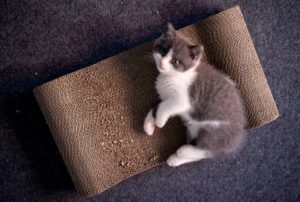Mr Yu’s cat died of a urinary tract infection. The cat’s name was Garlic. Mr Yu buried him in the park. A few hours later he dug him up and put it in the fridge. He had remembered something about a new company that had started to clone pets.
A man came over from Bejing and took skin samples. $35,000, and seven months later, Mr Yu is now the proud owner of his new version of Garlic – according to the press, China’s first cloned cat. Garlic mark 2 was born in the lab using a surrogate mother. It has been called “a feline version of The Handmaid’s Tale”.

China is the wild west when it comes to cloning, with no regulations applying to cloning animals. So far the company called Sinogene has cloned more than 40 dogs, at a cost of about $53,000 each. “There is market demand,” says the man from Sinogene, “so where is the problem?”
The problem is that life is not, and should not be, fungible. This is a word that is mostly confined to economics – which, given the commercial nature of the transaction here, is not inappropriate. When a commodity is fungible it is interchangeable, one kg of gold being entirely substitutable by, and equivalent to, another kg of gold, there being no significant difference between the two. Though what Mr Yu discovered much to his disappointment was that Garlic 2 wasn’t, in fact, an exact copy of his original pet. Garlic 2 was missing a small patch of black fur that Garlic 1 had on his chin. But this isn’t, of course, the moral problem.
The moral problem is that to think of our pets as fungible is to destroy the very quality that makes us love them – their specificity, their uniqueness. And this is all the more obvious if we think about doing the same thing for humans. Would a cloned child be an acceptable replacement for a recently deceased one? Obviously not. Would child 2 grow up with the knowledge that he existed as a life form only to be a copy of another? What would it feel like to know that one existed only as a vehicle for the remembrance of a previous version of oneself?
In this brave new world of genetic technology, human life is threatened not with extinction but – in an attempt to overcome personal extinction – by a new kind of meaninglessness. If our children are no longer special and unique, then they are just commodities to be replaced.
Of course, so far we are only talking about cats and dogs, not children. But as the technology advances, and perhaps also “market demand”, so too does the conceivability that we might, one day, start to think of human life as fungible – as opposed to unique and irreplaceable. And if we began to think of human life like this, imagine the cruelty, the inhumanity, that this might justify. “Sorry Mr Fraser, your son was killed in an accident at work. But don’t worry, here’s another one.”








Join the discussion
Join like minded readers that support our journalism by becoming a paid subscriber
To join the discussion in the comments, become a paid subscriber.
Join like minded readers that support our journalism, read unlimited articles and enjoy other subscriber-only benefits.
Subscribe